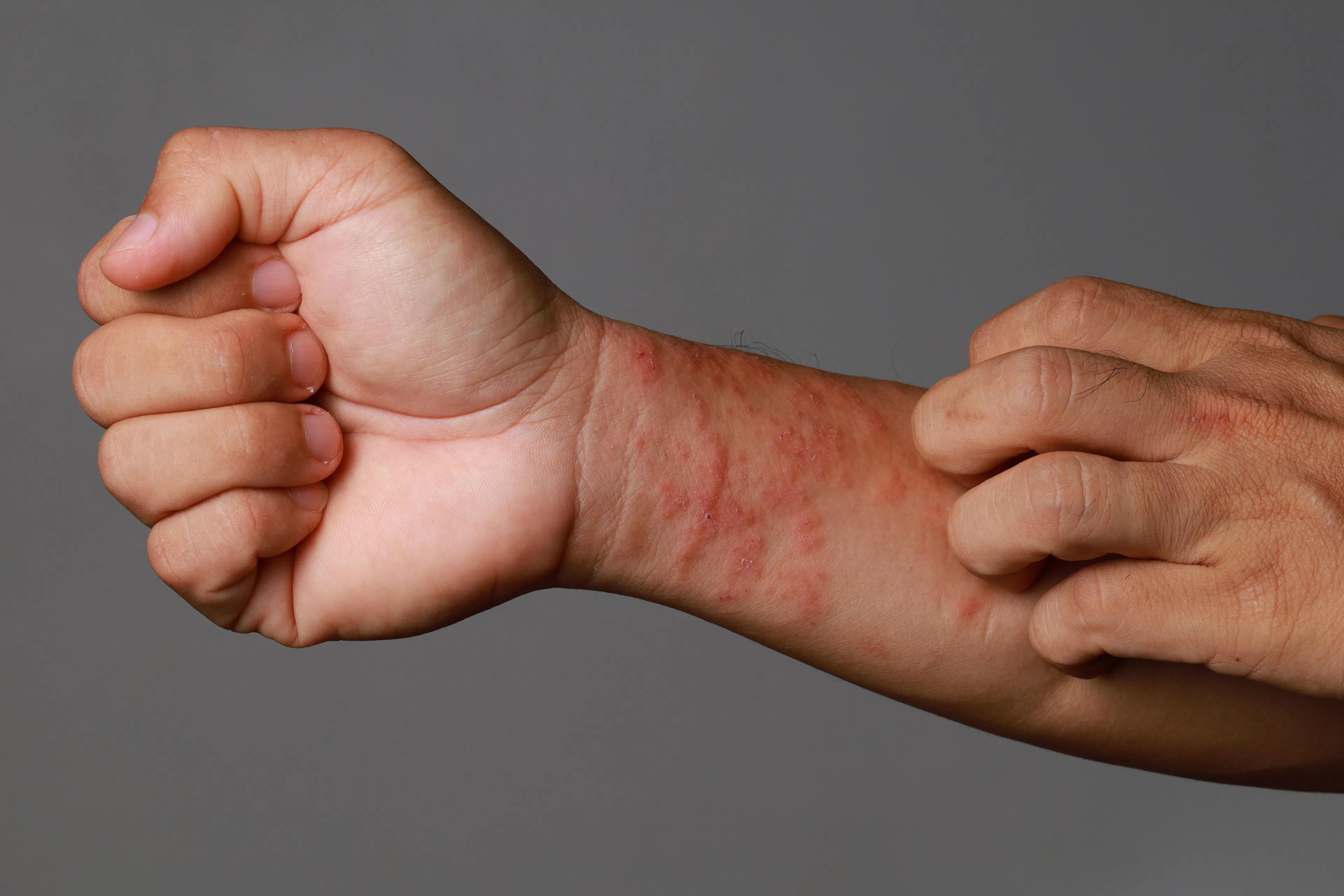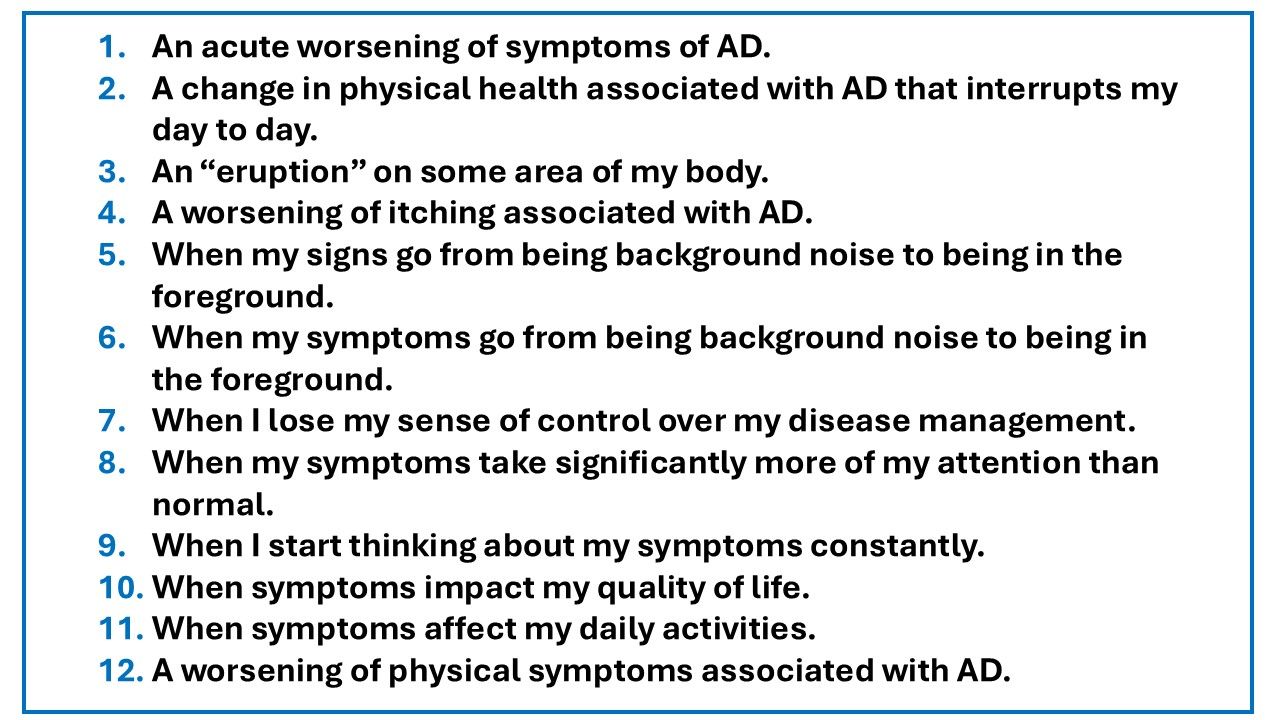- Clinical Technology
- Adult Immunization
- Hepatology
- Pediatric Immunization
- Screening
- Psychiatry
- Allergy
- Women's Health
- Cardiology
- Pediatrics
- Dermatology
- Endocrinology
- Pain Management
- Gastroenterology
- Infectious Disease
- Obesity Medicine
- Rheumatology
- Nephrology
- Neurology
- Pulmonology
How to Define an Atopic Dermatitis Flare: Survey Seeks New Patient Consensus
The term "flare" is used consistently in discussions of AD, but is everyone talking about the same thing? New research closes in on a patient-centered definition.
©Ityuan/stock.adobe.com

Among US adults with atopic dermatitis, statements ranked as most important to the definition of a disease “flare” were1:
- Acute worsening of AD symptoms
- Health changes that interrupt daily life
- A physical eruption
A total of 12 statements were identified by a new consensus survey that, according to study authors, was designed to “identify patient-reported attributes associated with the term flare and to achieve consensus on what features are critical to defining [atopic dermatitis] flares from the patient perspective.”1
The term flare is commonly used by health care practitioners, researchers, and by individuals with the condition to identify disease exacerbation. There is little consensus, however, on its meaning, which limits its utility as an outcome measure in clinical trials or as a defined concept in care settings, wrote principal investigator Wendy Smith Begolka, MBS, chief strategy officer at the National Eczema Association (NEA).1 Decreasing the frequency and severity of AD flares is a key goal of eczema treatment, “But if we don’t have a common understanding of what a flare is, and make sure that definition is in line with how people actually living with eczema think about their flares, there can be a serious disconnect,” said Begolka.2
There are validated measures of AD control used for research but a standardized definition of an AD flare from the “patient perspective” remains elusive, even after publication of recent NEA qualitative research that itself identified 6 key concepts.3
Modified eDelphi process
Begolka and her team used a modified eDelphi process to reach consensus among adults aged 18 years or older with a diagnosis of AD and “diverse lived experience and demographics.”1
Investigators capitalized on the previous NEA qualitative research using the final 6 concepts to develop a conceptual framework that would then be shared with focus groups to rate statement integral to an AD flare definition. They derived 98 statements, each structured as “An atopic dermatitis flare is…” and that addressed each of the framework’s 6 concepts.1
The full eDelphi process, including virtual focus groups and online survey, was conducted from January to October 2023 with the survey administered between September 7 and October 24, 2023. The survey was advertised to NEA members and assessed agreement of the wider AD community on whether focus group statements that reached consensus were essential to include in a patient-centered definition of an AD flare.1
Begolka and team used a rating scale ranging from 1 to 9 and defined consensus for a modified eDelphi statement as at least 70% of participants rating it between 7 and 9—an endorsement of the item as crucial to the definition of an AD flare. A statement was deemed unimportant with less than 15% of participants rating it between 1 and 3.1
Findings
The 26 focus group participants with AD ranged in age from 18 to 64 years with the majority (92.3%) between the ages of 18 and44 years. More than two-thirds (69.2%) were women, according to the study. Among the 631 survey respondents, mean age was 45.5 years and 84.5% were women.
Fifteen statements garnered consensus among members of the focus groups as essential to a patient-centered definition of AD, according to the findings, and of those, 12 achieved consensus among survey respondents (see below).1
Among survey respondents, approximately half (52.9%) responded “yes” when asked if they agreed with their primary AD health care professional on the definition of a flare, the team reported. More than three-quarters (77.6%) of them also believed in the value of a patient-centered definition for the purposes of improving clinician-patient communication as well as for explaining the condition to family and friends.1
The investigators noted that results suggested health care providers should be aware that individual patients may have different definitions of a disease flare and that it is important to ask during a clinical visit.
Begolka and team acknowledge the study’ limitations, which include the potential for self-selection bias given that study participants were members of an NEA organization and likely to have greater disease knowledge; the overrepresentation of women and participants identifying as White; and the larger proportion of participants with moderate-to-severe disease.
Nonetheless, they concluded: “Our findings may be useful in clinical practice to improve communication between patients and HCPs who may be using the term flare without a mutual understanding of its meaning. The findings may also be applied to the development of outcome measures focused on [atopic dermatitis] flares, which is an important treatment outcome for people with [atopic dermatitis].”

